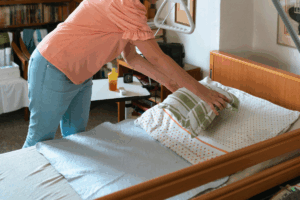As we get older, we tend to focus on our mobility and physical wellbeing, when in fact, our mental health is just as important. Research over the years has shown that staying sharp and mentally alert has a lot to do with lifestyle and not so much with age-related changes, and like anything, if it’s not taken care of and nurtured, it deteriorates. This includes the brain.
The onset of diseases such as Alzheimer’s and Dementia, are more commonly the underlying cause of a decline in mental ability, as are other changes including stroke, traumatic brain injury, depression or substance abuse. The University of Canberra1 reports that there are an estimated 459,000 Australians living with dementia; a figure that is expected to increase to 590,000 by 2028 and 1,076,000 by 2058.
Our cognitive health is important to our overall wellbeing — the ability to clearly think, learn, and remember — is a vital component when it comes to performing everyday activities, and while some of these changes are irreversible, there are many lifestyle changes we can start implementing to make a difference.
What is Brain Health?
Aspects of a fully functional brain include:
- Cognitive health — how well you think, learn, and remember
- Motor function — how well you make and control movements, including balance
- Emotional function — how well you interpret and respond to emotions
- Tactile function — how well you feel and respond to sensations of touch
A growing body of scientific research suggests that taking the following steps and making them a part of your daily routine, will help towards making a significant difference in how you function:
- Taking care of your physical health
- Getting enough sleep
- Staying connected and social
- Managing stress
- Managing high blood pressure
- Managing blood sugar
- Nutrition – eating healthier foods
- Moving – being more physically active
- Keeping your mind stimulated and active
At Home Care Assistance, our Care Workers are able to assist in helping you manage the day to day, including the preparation of balanced meals, a walk or taking your blood pressure. When it comes to healthy living, we have a holistic approach and an evidence-based program – the Balanced Care Method™. Our Care Workers are trained in this methodology to focus on physical exercise, healthy nutrition, cognitive stimulation, social engagement, and a purposeful and calm lifestyle with in-home care. With only a third of our life span determined by our genetics, and two-thirds determined by lifestyle factors, it’s never too late to get moving.
Boosting Cognitive Brain Health
Beyond these lifestyle recommendations to increase our overall wellbeing, there are additional activities to help boost brain health. These include:
Reading a book. Find a quiet spot, open a book, and learn from or travel with the author. Revisit some of your favourite books from your own library or try something new. If you are experimenting with different authors, borrow titles from your local public library. To keep your costs down, you could also purchase books from a second-hand bookshop or op-shop.
Doing a class. Computers? Creative writing? Cooking? Whatever the subject, there are many adult education classes offered at Community centres, schools or even online.
Tackling a crossword puzzle. Crossword puzzles can get the mental wheels rolling. The local newspaper might publish a crossword, or the local bookshop will have a good assortment of “puzzling” books for different levels of players (easy, intermediate, and most difficult). Word search puzzles can also improve cognitive abilities.
Playing board games. Challenge someone you know to a game of chess and challenge your brain to strategise. Help your children improve their money counting and math skills by playing Monopoly. There are many other board games which can be great fun to play and great exercise for the brain.
Associating with good people. Negativity often breeds negativity. Therefore, connecting with more positive individuals (e.g., those who are friendly, cheerful, supportive and/or who share your same beliefs and values) can work wonders for mental health.
Putting both your physical and mental health first matters and should be a priority, especially as we age. The two go hand in hand and when nurtured, can help in staving off cognitive decline and brain-related disease. Home Care Assistance Care Workers form strong and long relationships, becoming companions that not only facilitate and encourage cognitive and healthy activities but also take part in these activities, a walk, a board game. Through these activities Home Care Assistance Care Workers build connection and conversation, supporting positive mental and physical wellbeing and brain health.
Speak to a Home Care Assistance team member today to find how a Home Care Assistance Care Worker can make all the difference to better and healthier independent living.
References
As a leading age care provider, Home Care Assistance offers tailored in-home care services for older Australians, enabling them to live happier and healthier lives in the comfort of their own homes.
We offer private and government subsidised Care Packages and have office locations that are a registered NDIS provider. Our Care Workers undergo extensive training in order to deliver unmatched in-home aged care services where people can continue ageing in place. We are proud ambassadors of the My Aged Care government funded aged care program, enabling Australians to successfully navigate the process and gain approval for in-home care support packages. Home Care Assistance offers hourly care, specialised care, Alzheimer’s and Dementia care, hospital to home care, and 24 hour in home care.













